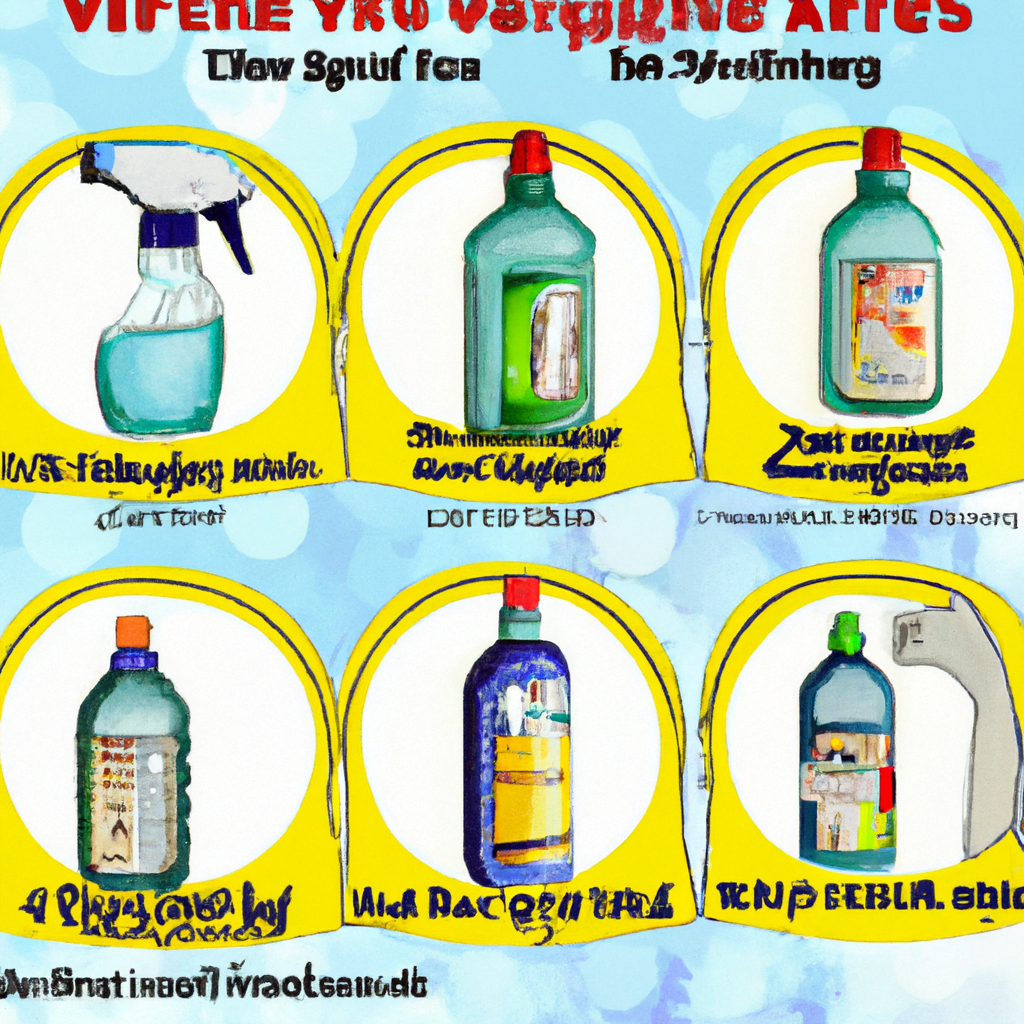Imagine having spotless, gleaming windows with just a few simple ingredients from your kitchen cupboard! With ‘Homemade Window Cleaner’, you’ll discover how you can create your own effective window cleaner that not only banishes dirt and grime but also leaves your windows sparkling like never before. This article will guide you step-by-step, offering practical advice and insightful tips to make your window cleaning task utterly effortless. Hence, say goodbye to expensive and damaging chemical-based cleaners, and embrace the wholesome purity of homemade alternatives.
Understanding the Need for Homemade Window Cleaner
You might wonder why you should even consider making your own homemade window cleaner when there are so many commercial options readily available. This section explains the reasons to switch and compares homemade cleaners with their commercial counterparts.
Reasons to switch to homemade options
Your decision to switch to homemade window cleaners can be motivated by a variety of factors. For starters, homemade cleaners are environmentally friendly as they do not contain any harmful chemicals that may harm the planet. You’ll notice that homemade cleaners are quite economical as well. The ingredients used are cheap and readily available. If you’re allergic to certain chemicals found in commercial cleaners, you can create a natural cleaner that is gentle on your skin. Not to mention, making your own cleaner gives you the freedom to adjust the formula to suit your specific needs.
Comparing homemade and commercial window cleaners
While commercial window cleaners are convenient, they often contain harsh chemicals that are bad for both your health and the environment. They also generate more waste due to their plastic packaging. On the other hand, homemade cleaners are eco-friendly and give you the flexibility to choose ingredients that are safe for your family. However, it’s vital to follow the right recipes and mixing proportions to ensure that your homemade cleaner is effective.
Ingredients Required for Homemade Window Cleaner
Before starting your DIY window cleaner project, it’s essential to know the common ingredients you’ll need and understand their purpose. Here, we’ve also included some safety tips.
Common household items used
Common ingredients for homemade window cleaner include distilled water, white vinegar, ammonia, rubbing alcohol, essential oils, and dish soap. For a citrus-based cleaner, you’ll need citrus fruit peels in addition to the above ingredients. For a cornstarch cleaner, you’ll need cornstarch too.
The function of each ingredient
Distilled water is used as a base for most cleaners. Vinegar and ammonia are powerful cleansers that effectively break down dirt and grime. Rubbing alcohol is excellent for quick drying and preventing streaks, while essential oils add a pleasant scent and have antibacterial properties. Dish soap dissolves grease, and cornstarch acts as a mild abrasive. Citrus peels, on the other hand, have natural oils that help clean and shine your windows.
Safety tips when handling these ingredients
While all these ingredients are generally safe for handling, exercising certain precautions is advisable. Avoid contact with your eyes, and keep the cleaners out of reach of children. When using ammonia, ensure adequate ventilation as it can irritate your nose and eyes. Likewise, pure vinegar can also be quite pungent, so be careful during usage.

Detailed Recipe for Vinegar Based Window Cleaner
Vinegar-based window cleaner is one of the most popular and effective homemade solutions. Here we provide a step-by-step guide.
Step-by-step process
You’ll need a cup of distilled water, a cup of white vinegar, and a few drops of essential oils (if desired). Mix the water and vinegar together in a spray bottle, add the essential oil and shake well. Your homemade vinegar-based window cleaner is now ready to use.
Tips for effective mixing
When mixing your ingredients, always add water first to avoid foam from the vinegar. Begin with a small amount of essential oil; you can always add more if you want a stronger fragrance.
Precautions while using vinegar
While vinegar is an excellent cleaner, the smell can be quite strong. Avoid using too much vinegar, especially in enclosed spaces, to avoid an overpowering smell. Always wear gloves when handling vinegar to protect your skin.
Making Natural Citrus Based Window Cleaner
Want to try out a fruity window cleaner that leaves your windows sparkling clean? Here’s how you can make a citrus-based window cleaner.
Steps involved in preparation
Peel a citrus fruit like an orange or a lemon and let the peels dry for a few days. Then, pour white vinegar into a jar filled with these peels and leave it for a few weeks, allowing the vinegar to absorb the oils from the peels. Once the vinegar is ready, strain it into a spray bottle and add an equal amount of water. Your natural citrus cleaner is ready.
Procuring citrus peels
Consider saving your peels from every citrus fruit you consume. You can use any citrus fruit peels including oranges, lemons or grapefruits. Just make sure they are fresh when you add them to the vinegar.
Benefits of using citrus-based cleaners
Citrus-based cleaners don’t just smell great – they also have excellent cleaning properties. The natural oils in the citrus peels help break down grime, giving your windows a nice, clean shine.

Ammonia Based Homemade Window Cleaner
Please stay cautious when creating an ammonia-based cleaner, as it is a powerful ingredient. Here’s the method.
Steps to create an ammonia-based cleaner
Combine a cup of clear, non-sudsing ammonia, a cup of white vinegar, and two tablespoons of cornstarch in a gallon of warm water. Mix until the cornstarch has completely dissolved. Then, transfer this mixture to a spray bottle.
Safety advice when using ammonia
Use ammonia-based cleaners only in well-ventilated areas as the fumes can be quite strong and potentially harmful if inhaled in large quantities. Always use gloves while handling ammonia.
Effective ways to reduce ammonia smell
The strong smell of ammonia can be quite unpleasant. Adding a few drops of your favorite essential oil can help mask the odor while providing a pleasant scent.
Cornstarch Based Window Cleaner
Cornstarch works wonders as a natural cleaner. Here’s how to use it in your homemade window cleaner.
Preparation methods
Mix one quart of warm water with a quarter cup of vinegar and a tablespoon of cornstarch. Ensure that the water is warm enough to dissolve the cornstarch completely. Once fully mixed, transfer the solution into a spray bottle.
Why cornstarch is effective
Cornstarch isn’t just a thickening agent for cooking – it’s also an effective natural abrasive. It can help to remove stubborn grime and dirt from your windows, leaving them clean and streak-free.
Ideal utilization of cornstarch based cleaner
Owing to its abrasive nature, a cornstarch based cleaner works best for windows with stubborn stains. Spray it on, let it sit for a bit, then wipe clean with a soft cloth – you’ll notice the difference.
Usage Instructions for Homemade Window Cleaner
Now that you’ve made your homemade window cleaner, here are some tips to use it effectively.
Effective application techniques
Always shake your cleaner before use to ensure that the ingredients are well mixed. Then, spray it on the window and wipe clean with a soft, lint-free cloth or a squeegee.
Best time for cleaning windows
Believe it or not, there’s an ideal time to clean windows! Aim for a cool, cloudy day as cleaning windows in direct sunlight can cause the cleaner to dry too quickly and leave streaks.
How to avoid streaks during cleaning
The secret to avoiding streaks is to clean the window in one direction on the inside (like top to bottom), and the other direction on the outside (like left to right). This way, if there are streaks, you can easily tell which side they’re on.
Storing Homemade Window Cleaner
Homemade cleaners may not have the same shelf-life as commercial ones, but with proper storage, they can last quite some time.
Preferred storage containers
Ideally, store your homemade window cleaner in a dark, glass spray bottle to protect the cleaner from sunlight. If you don’t have a glass bottle, a plastic one can be used as a second option.
Shelf life of homemade window cleaners
A homemade window cleaner can be stored for around a month. After that, the effectiveness of the cleaner may begin to reduce.
Do’s and Don’ts while storing
Store your homemade window cleaner in a cool, dark place. Always label your cleaner with the ingredients used and the date it was made. Never mix vinegar and ammonia in the same bottle as this produces harmful fumes.
Precautions when using Homemade Window Cleaners
Homemade window cleaners are generally safe. However, certain precautions are necessary to ensure safe usage.
Checking for allergic reactions
If you’re using a new ingredient, try a patch test on a small area of your skin first to check for any adverse reaction.
Handling instructions for safe usage
Wear gloves while cleaning, especially if you’re handling strong ingredients like ammonia or vinegar. Keep the cleaner out of reach of children.
What to do in case of accidental consumption
If accidentally ingested, do not induce vomiting. Rinse your mouth with water and then reach out to a medical professional immediately.
Environmental Impact of Homemade Window Cleaner
Lastly, let’s discuss the environmental benefits of homemade window cleaners.
How homemade cleaners reduce pollution
By using natural ingredients in your cleaning solutions, you help reduce the manufacture and use of harmful chemicals, thus cutting down on pollution.
Recycling and waste management
By using homemade cleaners, you also cut down on waste from plastic bottles that most commercial cleaners are sold in. You can reuse the same spray bottle each time you make a new batch of cleaner.
Promoting sustainable cleaning options
Your switch to homemade cleaners is an excellent conversation starter. Encourage your friends and family to make the switch, promoting a healthier and cleaner environment.
In conclusion, making your own homemade window cleaner can be a fun and rewarding experience that not only spares your pocketbook, but also does a favor to your health and the environment. Enjoy crafting your own cleaners and delight in the freshness and clarity they bring to your windows!
